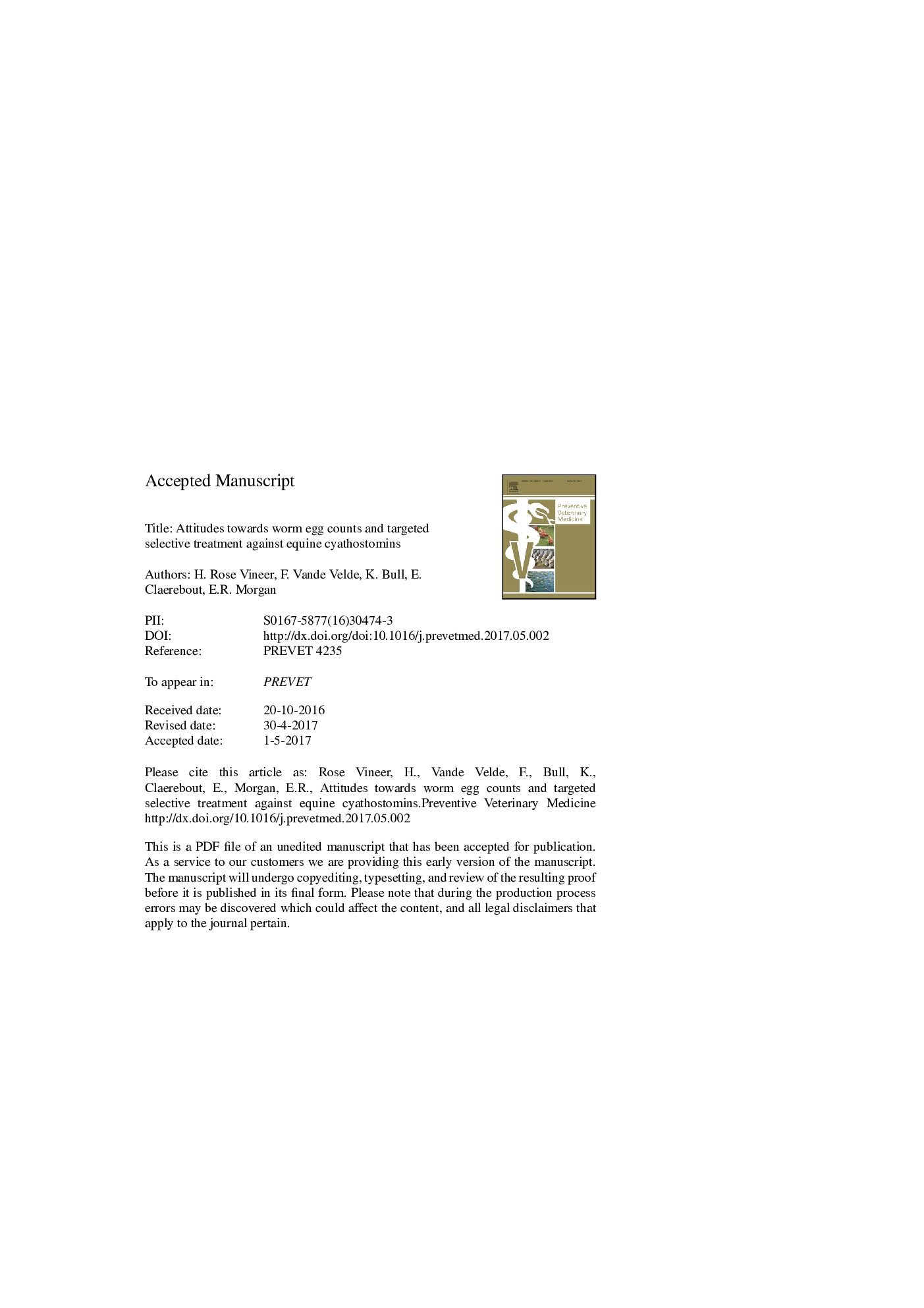| کد مقاله | کد نشریه | سال انتشار | مقاله انگلیسی | نسخه تمام متن |
|---|---|---|---|---|
| 5543710 | 1554146 | 2017 | 42 صفحه PDF | دانلود رایگان |
عنوان انگلیسی مقاله ISI
Attitudes towards worm egg counts and targeted selective treatment against equine cyathostomins
ترجمه فارسی عنوان
نگرش نسبت به تعداد تخم مرغ کرم و درمان انتخابی هدفمند در برابر سایاتوستوم های اسب
دانلود مقاله + سفارش ترجمه
دانلود مقاله ISI انگلیسی
رایگان برای ایرانیان
کلمات کلیدی
SRMRfaecal worm egg countRMSEATLITPBFECCFIHBMEFACFAGreat Britain - بریتانیای کبیرTheory of planned behaviour - تئوری رفتار برنامه ریزیExploratory Factor Analysis - تجزیه و تحلیل فاکتور اکتشافیConfirmatory Factor Analysis - تحلیل عاملی تاییدیFaecal egg count - تعداد تخم مرغ فاکGIN - جینRoot mean square error of approximation - ریشه میانگین خطای تقریبی مربعTucker-Lewis index - شاخص تاکر-لوئیسComparative Fit Index - شاخص مناسب مقایسهHealth Belief Model - مدل اعتقاد بهداشتیStructural equation model - مدل معادلات ساختاریSEM - مدل معادلات ساختاری / میکروسکوپ الکترونی روبشیAnthelmintic resistance - مقاومت آنتیگلمینتیکGastrointestinal nematode - نماتدهای دستگاه گوارشUnited Kingdom - پادشاهی متحده بریتانیا
موضوعات مرتبط
علوم زیستی و بیوفناوری
علوم کشاورزی و بیولوژیک
علوم دامی و جانورشناسی
چکیده انگلیسی
Gastrointestinal nematodes present a major threat to the health and welfare of equids worldwide. Anthelmintic resistance (AR) is increasingly reported and challenges effective control in horses and ponies in many regions. The use of faecal worm egg counts (FECs) to support targeted treatment (FEC-TT) and targeted selective treatment (FEC-TST) has been promoted as an effective deworming strategy that may prolong the useful life of anthelmintics and reduce the costs associated with parasite control. However, treatment applied at set intervals or on pre-determined dates remains common. A structural equation model was developed to identify factors influencing the uptake of FEC-directed treatment strategies, based on well-established socio-psychological theories of intentional health-related behaviours: the Theory of Planned Behaviour and the Health Belief Model. More than 850 valid responses were received from horse owners in the UK via an online survey. The intention to use FECs prior to deworming was not influenced by the perceived risk of anthelmintic resistance or that of gastrointestinal nematode infection but was positively influenced by a negative attitude towards anthelmintics, a positive attitude towards FECs, an increase in social pressure (e.g. significant others think the respondent should use FECs) and an increase in perceived control over their deworming programme. The results were consistent with a similar study conducted on FEC-TT in cattle in Belgium. An increase in respondents' self-perceived level of knowledge significantly increased the intention to use FECs via mediating factors. These results suggest that knowledge transfer activities aimed at increasing awareness and understanding of sustainable nematode control practices may be more effective at encouraging behaviour change than emphasising the dangers of nematodes and AR, which had limited influence on behaviour intention in this study population.
ناشر
Database: Elsevier - ScienceDirect (ساینس دایرکت)
Journal: Preventive Veterinary Medicine - Volume 144, 1 September 2017, Pages 66-74
Journal: Preventive Veterinary Medicine - Volume 144, 1 September 2017, Pages 66-74
نویسندگان
H. Rose Vineer, F. Vande Velde, K. Bull, E. Claerebout, E.R. Morgan,
